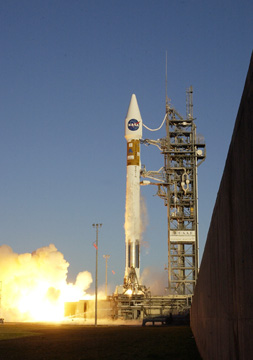SPACECRAFT AND EXPENDABLE VEHICLES STATUS REPORTOctober 2, 2002 George
H. Diller Kennedy
Space Center 321/867-2468
LAUNCH VEHICLE: Lockheed
Martin Atlas IIA (AC-144) LAUNCH SITE: Pad 36-B, Cape
Canaveral Air Force Station LAUNCH DATE: November 20,
2002 LAUNCH WINDOW: 10:36
p.m. – 11:16 p.m. EST
The Atlas II
launch vehicle is at the Lockheed Martin factory in Denver, Colorado undergoing
final assembly, integration and testing.
Both Centaur stage engines have been installed. Associated electrical harnesses are
being installed and the aft area of the stage is undergoing electrical and
mechanical build-up. The arrival of the booster at Cape Canaveral Air Force
Station is now scheduled for October 7. The TDRS-J spacecraft is undergoing testing at the
factory and is planned to arrive at Kennedy Space Center from the Boeing
Satellite Systems plant in El Segundo, California on October 17. MISSION: Solar Radiation and Climate Experiment
(SORCE) LAUNCH VEHICLE: Pegasus XL LAUNCH LOCATION: Cape Canaveral Air Force Station LAUNCH DATE:
December 1, 2002 LAUNCH WINDOW: 3:10 p.m. – 4:10 p.m. EST SORCE is at
the Orbital Space Systems Group spacecraft facility in Dulles, Virginia and has
satisfactorily completed space environment tests. The spacecraft is scheduled to arrive at Kennedy Space
Center to begin final processing on October 26. The Orbital Sciences
Pegasus XL launch vehicle continues to undergo buildup and testing at
Vandenberg Air Force Base. Two
Flight Simulation tests are scheduled while the vehicle is in California. Flight Simulation No. 1 is scheduled
for October 9 and will be followed by Flight Simulation No. 2 on October 16. The Pegasus
is scheduled for ferry to Cape Canaveral using the Orbital Sciences L-1011
aircraft on October 29. Three
Flight Simulation tests are also planned at KSC prior to launch and are
scheduled to occur on November 1, November 8 and November 18.
MISSION: Ice, Cloud and Land Elevation Satellite
(ICESAT) and the Cosmic Hot Interstellar Plasma Spectrometer (CHIPSAT) LAUNCH VEHICLE: Delta II w/Dual Payload Attach Fixture
(DPAF) LAUNCH SITE: SLC-2W Vandenberg Air Force Base (VAFB) LAUNCH DATE: NET December 15, 2002 LAUNCH WINDOW: 4:09:32 – 5:32:00 p.m. PST The ICESAT
spacecraft is at the Ball Aerospace Facility in Boulder Colorado currently
undergoing vibration testing to assure electrical and mechanical connections.
The ICESAT spacecraft is scheduled to arrive at Vandenberg Air Force Base on
October 29. The
CHIPSAT spacecraft is at Kirtland Air Force Base, New Mexico. It successfully concluded vibration
testing last week and is undergoing thermal vacuum testing this week. The
CHIPSAT spacecraft is scheduled to arrive at Vandenberg Air Force Base on
October 15. The Delta II
first and second stage have arrived at Vandenberg after successfully completing
checkout at Cape Canaveral Air Force Station. The booster is scheduled for
erection October 22 on Space Launch Complex 2 located on North Vandenberg Air
Force Base.
# # #
|
------------------------------------------------------------- For automatic email subscriptions to this KSC originated press releases, send an Internet electronic mail message to mailto:ksc-news_release-subscribe@kscnews.ksc.nasa.gov. With no subject or message. The system will reply with a confirmation via e-mail of each subscription. To remove your name from the list at any time, send an email addressed to mailto:ksc-news_release-unsubscribe@kscnews.ksc.nasa.gov . With no subject or message. or you can (un)subscribe on the World Wide Web at: http://kscnews.ksc.nasa.gov/ Status reports and other NASA publications are available on the World Wide Web at: http://www-pao.ksc.nasa.gov/kscpao/kscpao.htm .

